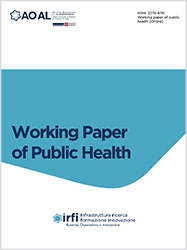The role of expectations and patients' decision making process
Submitted: 18 July 2016
Accepted: 18 July 2016
Published: 15 June 2013
Accepted: 18 July 2016
Abstract Views: 360
PDF: 354
Publisher's note
All claims expressed in this article are solely those of the authors and do not necessarily represent those of their affiliated organizations, or those of the publisher, the editors and the reviewers. Any product that may be evaluated in this article or claim that may be made by its manufacturer is not guaranteed or endorsed by the publisher.
All claims expressed in this article are solely those of the authors and do not necessarily represent those of their affiliated organizations, or those of the publisher, the editors and the reviewers. Any product that may be evaluated in this article or claim that may be made by its manufacturer is not guaranteed or endorsed by the publisher.
Supporting Agencies
Bergonzini, C., & Ippoliti, R. (2013). The role of expectations and patients’ decision making process. Working Paper of Public Health, 2(1). https://doi.org/10.4081/wpph.2013.6747
PAGEPress has chosen to apply the Creative Commons Attribution NonCommercial 4.0 International License (CC BY-NC 4.0) to all manuscripts to be published.

 https://doi.org/10.4081/wpph.2013.6747
https://doi.org/10.4081/wpph.2013.6747




